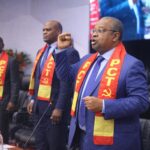Brazzaville-Havana partnership renewed
In Brazzaville this week, Minister of International Cooperation and Public-Private Partnership, Denis Christel Sassou Nguesso, received Ambassador Indira Napoles Coello. The warm handshake opened a new chapter in a six-decade friendship that continues to place people’s wellbeing at the centre of bilateral action.
- Brazzaville-Havana partnership renewed
- Health frontlines feeling the support
- Training doctors the Cuban way
- Government vision for resilient systems
- Education ripple effects beyond medicine
- Long road, steady companions
- What next for patients and students?
- A partnership poised to grow
- Digital leap in telemedicine
After the meeting, the Congolese minister posted on X that both delegations had “reaffirmed our determination to strengthen this historic cooperation and adapt it to today’s priorities”. The message instantly resonated with students, doctors and patients who see tangible benefits from the Cuba-Congo bridge.
Health frontlines feeling the support
Cuba’s medical solidarity is visible in hospitals across Brazzaville, Pointe-Noire and regional centres. From paediatrics to surgery, Cuban physicians have become trusted mentors, sharing protocols and filling gaps in underserved wards. Administrators say their presence keeps essential services running smoothly, particularly in rural referral units.
Many patients still remember the swift Cuban response during the 2014 chikungunya episode. “Their doctors stayed until the last case was cleared,” recalls Clarisse, a market vendor in Talangaï. She believes the renewed accord will “bring even more expertise for mothers and children this time”.
Training doctors the Cuban way
Formal cooperation in education began in 2013, when the Congolese government started funding scholarships for young medical students at Cuban universities famed for community-centred curricula. The goal: build a self-reliant national workforce able to diagnose, treat and prevent with the same rigour found in Havana.
The programme’s first cohort of 431 graduates returned home in July 2020. They are now completing immersion internships in public hospitals from Makélékélé to Dolisie. Supervising physicians report that the alumni bring strong preventive-care instincts and an admirable habit of involving families in recovery plans.
Student Laure Koubemba, currently posted at Loandjili General Hospital, says the Cuban approach emphasises “listening before prescribing”. She credits small-group workshops in Santiago de Cuba for boosting her bedside confidence. “We learned to run clinics with scarce resources—a reality at home—yet still keep records impeccable,” she adds.
Government vision for resilient systems
By doubling down on this exchange, Brazzaville hopes to accelerate the national health development plan. Officials highlight telemedicine, biomedical maintenance and emergency obstetrics as possible new axes. Aligning projects with the Emerging Congo 2025 strategy should, they argue, multiply returns without straining the public budget.
Minister Denis Christel Sassou Nguesso underlines that creating space for private partners will be crucial. Public-private clinics could host binational teams, while alumni may launch start-ups supplying locally produced consumables. Such spin-offs, he contends, would “transform cooperation into jobs along the entire care chain”.
Education ripple effects beyond medicine
While healthcare remains the flagship, Cubans have started sharing experience in literacy and technical teaching. Pilot workshops on science pedagogy were recently organised for primary-school inspectors in Brazzaville, using interactive methods developed in Havana. Participants say the tools could boost exam success rates in remote districts.
The education ministry is now mapping future exchanges in agronomy, sport science and cultural management. Analysts note that such diversification echoes the original revolutionary ethos of Cuba’s internationalism: strengthening sovereignty through knowledge transfer rather than dependency, a narrative warmly received by Congolese youth advocates.
Long road, steady companions
The Cuba-Congo story dates back to 1964, when Brazzaville recognised the island’s new government despite Cold War pressures. Over the decades, the friendship outlasted geopolitical swings and economic storms. Observers say the current reboot shows both capitals still value solidarity rooted in concrete social programmes.
Ambassador Napoles Coello reminded local press that “cooperation is not a slogan but a daily practice”. Her team is preparing cultural evenings featuring Cuban cinema and traditional music to accompany the technical projects. “People learn faster when hearts are open,” she told journalists in brief remarks.
What next for patients and students?
In the coming weeks, ministries will draft an updated roadmap detailing the number of additional Cuban specialists to be deployed and the quota of Congolese students for the 2024-2025 intake. Health unions expect paediatric oncology, a rising concern, to appear high on the list.
For young Congolese like Laure Koubemba, the prospect is simple: “If we can cure children at home, families stop selling land to travel abroad.” Her words echo across hospital corridors, underlining why decision-makers on both sides view the alliance not as charity but shared ambition.
A partnership poised to grow
As Brazzaville lights reflected off the ambassador’s motorcade, officials stressed that the meeting was only the beginning of a refreshed agenda. With political will aligned, the Congo-Cuba axis appears set to evolve from proven medical aid into a broader engine for inclusive development and cultural exchange.
Digital leap in telemedicine
Engineers from both nations are drafting a pilot telemedicine link that will connect the University Hospital of Brazzaville with Santiago’s Institute of Tropical Medicine. The high-definition platform aims to allow real-time consultation on complex cases, shortening referral delays and cutting transport expenses for upcountry families.






















